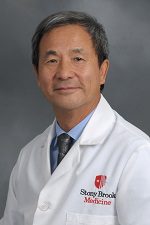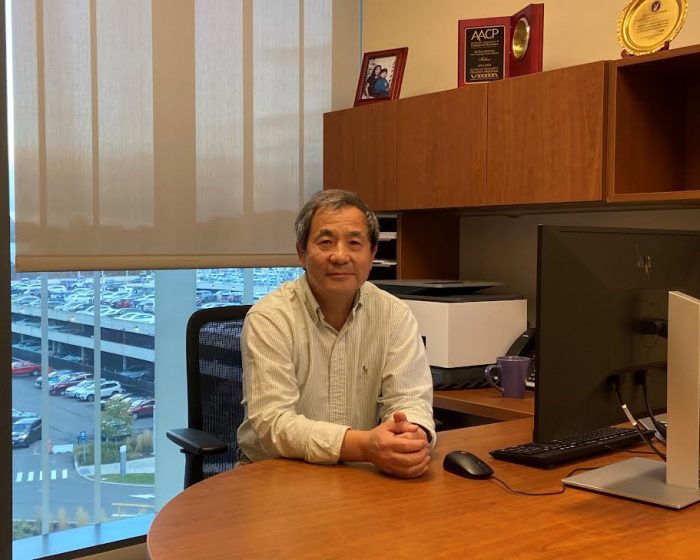Ke Jian Liu brings leadership and research on cancer, stroke to SBU
By Daniel Dunaief
Ke Jian “Jim” Liu, who arrived at Stony Brook University in late July, plans to help build effective, interdisciplinary research teams.

Most recently at the University of New Mexico, Liu joins Stony Brook as a Professor in the Renaissance School of Medicine’s Department of Pathology and Associate Director of Basic Science at the Stony Brook Cancer Center.
“In my mind, Stony Brook, research wise, is outstanding,” Liu said in an interview. “The quality of the faculty is excellent.”
Liu will rely on the team building experience he honed while serving as Distinguished Professor in the Department of Pharmaceutical Sciences and Associate Dean for Research in the College of Pharmacy at the University of New Mexico. He also worked for eight years at Dartmouth Medical School, where he focused on developing larger collaborations.
“I really enjoy working with people and building teams,” Liu said.
In a note announcing Liu’s arrival, Kenneth Shroyer, chair in the Department of Pathology, recognized Liu’s multidisciplinary approaches in his research. Shroyer explained that Liu has used techniques ranging from chemical to biochemical to biophysical, and from the molecular and cellular level to animal models, to answer specific biological questions.
Shroyer wrote that Liu would focus on opportunities for grant development within several programs.
At the Cancer Center, Liu said he plans to continue the effort to help Stony Brook earn National Cancer Institute designation.
To achieve that designation, Stony Brook will need to continue to provide outstanding medical care, demonstrate community engagement and highlight what makes Stony Brook different from everyone else, he said.
“It takes a village to do that,” Liu said.
He praised the efforts of current Cancer Center Director Yusuf Hannun, who recently announced his plans to step down as head of the center, triggering a nationwide search for a replacement.
Liu said an ideal candidate for that position would have clinical experience.
Player coach
With a busy research effort and lofty leadership goals, Liu explained that he’s able to tackle numerous challenges at once.
“I consider myself a player coach,” he said. “I enjoy research. I have my own research grant and am working with my students and post docs.”
Liu typically maintains a lab with five to six people at different levels. His research has two branches, cancer and stroke, that most people likely consider unrelated, but for which he has found connections.
“People always think, ‘Cancer is cancer and stroke is stroke and they are two entirely different diseases,” Liu said. As a basic researcher, however, he looks at the cells and the molecules involved in both conditions.
“At a molecular level, a molecule doesn’t care where it is,” he said. “When a disease develops, the biological fundamental process is the same. For me, it’s interesting to look at [whether] certain processes that occur in the brain also occur in cancer.”
Liu’s cancer research focuses specifically on the molecular processes that become carcinogenic when metals like arsenic enter people’s bodies. A well-described poison in numerous murder mysteries, arsenic can contaminate drinking water, get incorporated into crops like rice, or can appear in fruit juices.
When metal enters the body, it doesn’t just cause damage everywhere. It has to find a certain molecular target with which to interact.
What Liu and researchers in his lab have discovered is that the target for arsenic is often the same pathways the body uses in zinc. A transition metal, zinc provides an important element as a part of transcription factors that are critical in biological processes.
Arsenic, however, replaces zinc, which is “one of the major mechanisms for carcinogenesis,” Liu said.
Fortunately for residents of Long Island, arsenic isn’t as prevalent as it is in the midwest and the southwest.
“Long Island doesn’t have too much arsenic in drinking water,” Liu said, although people are still exposed to it through fruit juices, rice and other products.
Arsenic also causes vascular disease issues and anemia. People who develop these other conditions in response to arsenic are also at higher risk to develop cancer. The specific types of cancers arsenic causes are lung, skin and bladder cancer.
“Arsenic is the dirty bomb” in the body as it creates multiple problems, Liu said. “Arsenic interacts with those key zinc molecules.”
Overlap between stroke and cancer
In highlighting the overlaps between the two fields of research, Liu related how the brain has one of the highest concentrations of zinc in the body.
When people have strokes, their brain cells have oxidative stress, which causes a flood of zinc into the brain tissue that also damages cells.
“We are trying to understand how zinc is released and how zinc causes damage to the brain,” Liu said.
Stroke and cancer also have molecular overlaps regarding oxygen. In a stroke, a blood clot causes a blockage of blood flow. Without oxygen, a situation called hypoxia, neurons start to die.
By contrast, a tumor grows in a hypoxic environment, using energy from sugars like glucose, rather than relying on oxygen for its growth.
Liu emphasized the importance of continuing to provide oxygen to brain regions around a clot even before trying to remove the clot or restore blood flow.
A goal for his 100th year
Originally from Beijing, China, Liu and his wife Jiao Ding enjoy traveling. Their daughter Sarah Liu is a resident at Vermont Medical Center and their son Evan Liu is a PhD student at Stanford.
An avid tennis player who plays the sport at least twice a week, Liu is looking forward to attending his first U.S. Open next year.
He and his former tennis partner in New Mexico joked that their goal is to be in the top 20 in the United States when they are 100 years old.
Liu chose the American name “Jim” because it sounds similar to the second syllable of his given name, Ke Jian.
“If people can’t pronounce your name, they shy away,” he said. He believes it’s important to “make yourself adaptable.”







